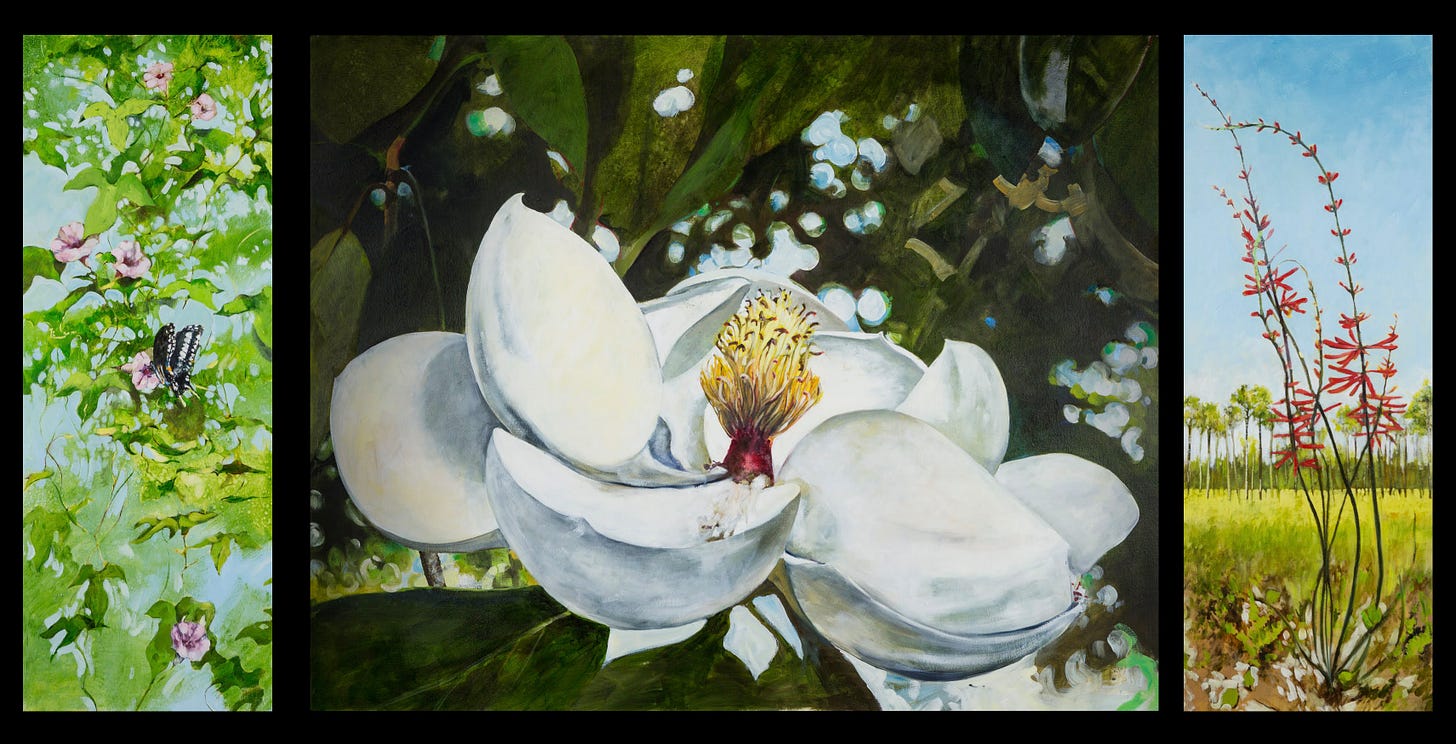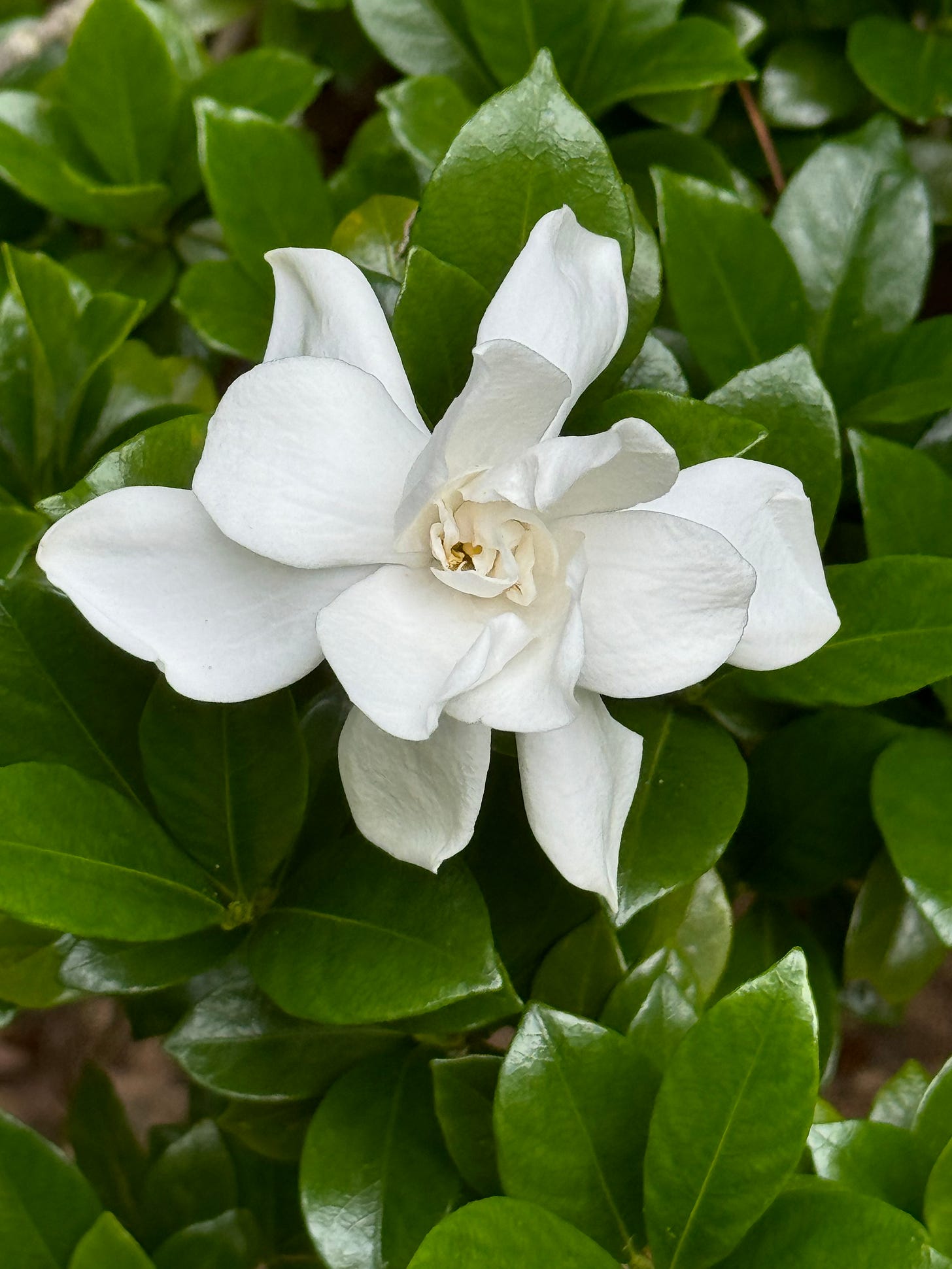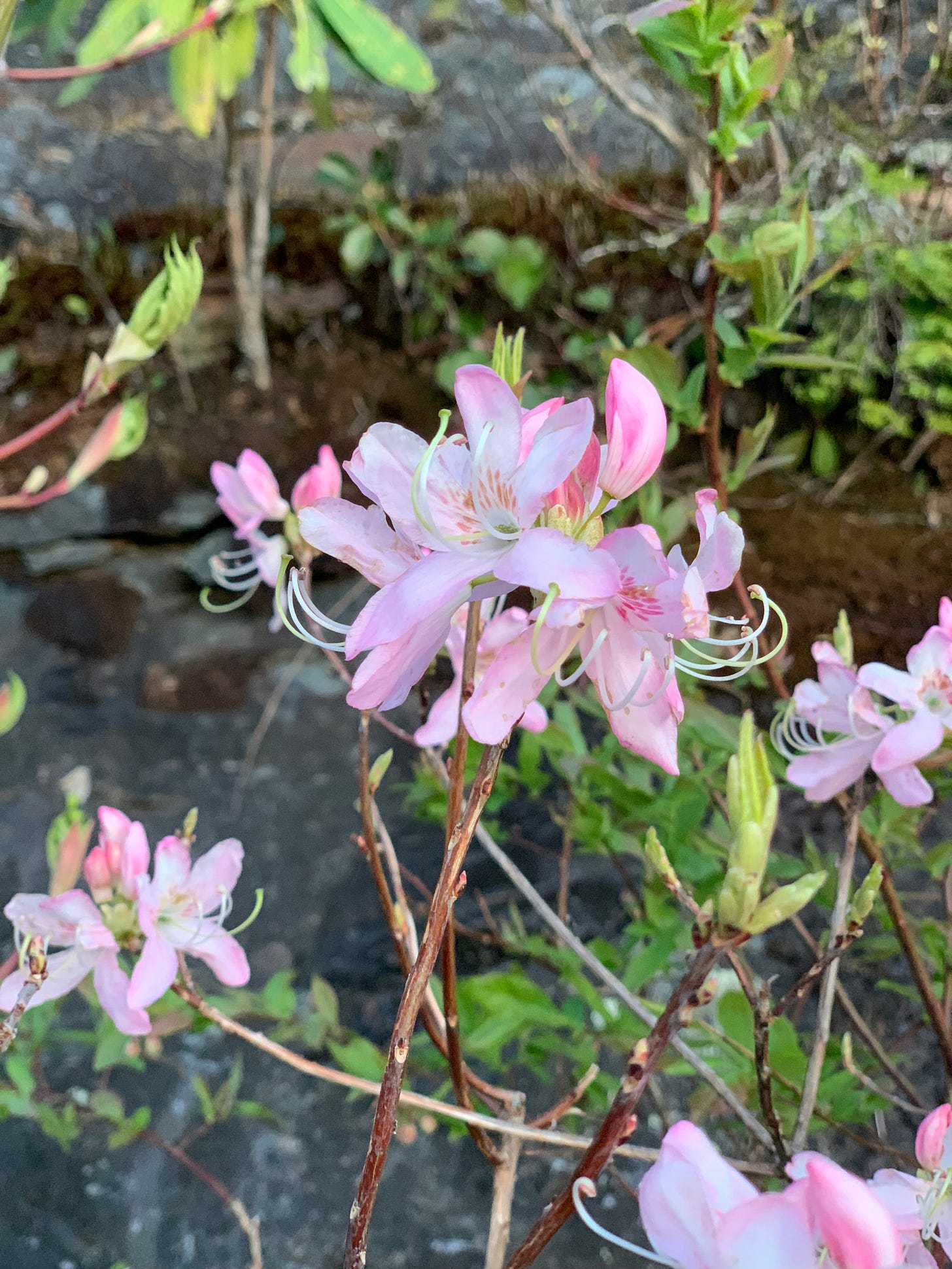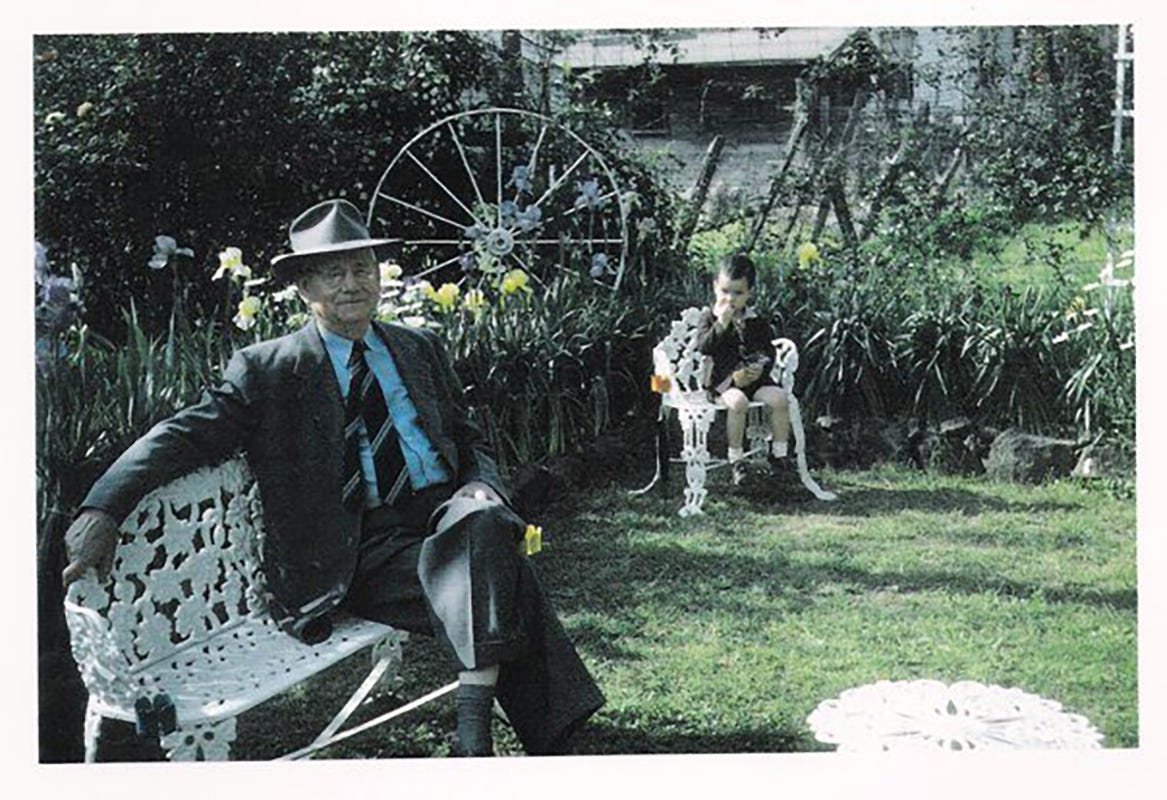I’m southern, or at least I was. Now I am not so sure. We’ve grown apart.
Magnolia Altarpiece Feast of Flowers 2012
Mississippi is the Magnolia State. Or at least it was. I’m not sure anymore.
The fragrance of the massive white flowers anointed my spring walk to school. That earthy scent of the cones and red seeds proclaimed fall. Every time I see one either in the wild or captivity I bow to its presence. That stately tree. Black-green leaves with fawn- velvet undersides remind me of a place and time long ago.
Magnolia grandiflora. Cone soon to open to reveal bright red seeds.
Mississippi is know for its gardens. Or at least it was. Gardens were more than a source of sustenance. More than inspiration. More than breathtaking beauty. They were a cultural endeavor. We all grew stuff. Flowers spilled into walks and streets. Tomatoes and Dahlias were measured in terms of china. Big as a dinner plate. Size of salad plate. Could fit in a tea cup. The colors were rich to pale. Red as cow blood. Green as poison. Pink as a baby’s butt.
Gardenia jasminoides, Cape Jessamine
And the scents. Spring magnolia gave way to summer gardenias. Evening intoxication of Four-o’clocks. Early spring winter honeysuckle reminded us that its cousin was not far behind.
Rhododendron canescens. Pinxter Azalea.
Gardens were for show, the front flower garden and the vegetable garden in the back. All to be admired. A source of pride. A way of life.
We all lived in a house on East Jefferson Street in Kosciusko. My grandfather built the house in 1921. Daddy grew up there. When he married mama she moved in with them. Ten years later, my mother, on the verge of a breakdown, insisted that my grandparents move out of the house. She gave my father an ultimatum. “Either they go or I go. I can’t live in the same house with your mother another year.”
So my parents built a small cottage next door and moved my grandparents into it. I was delighted. Not only were they close by but also they lived in a separate house so I could spend time there with them and escape the pressures of my house. Don’t really remember what those pressures were but I always felt more comfortable with my grandparents.
Mammy and PaJim were old. They were born in rural Mississippi in the 1880’s. Choctaw County. Children and grandchildren of South Carolinians who moved into Mississippi after the Treaty of Dancing Rabbit Creek opened Choctaw land for settlers. The remaining natives were squeezed into a few reservations in Neshoba and Leake Counties.
My grandfather, PaJim. James William Draper 1884-1971. Mrs Gee’s garden in Grenada, Mississippi. c. 1956
I had a delightful childhood with them. My grandmother taught me how to write in cursive. She had a beautiful gold nib fountain pen. Marbled blue. She let me use it to draw.
As she developed what was called hardening of the arteries her doctor suggested that she drink a glass of wine every afternoon. Daddy would drive to the bootlegger on the edge of town and buy Mogen David wine for her. We looked forward to the afternoon ritual. I still taste it. Sweet. Very sweet but with a kick. I climbed up on the kitchen stool and held out my juice glass (one of those with fruit painted on it). She drizzled a careful half-full pour of the syrupy indigo liquid. Yum.
The last time I had anything close to that taste was at my brief time going to the Episcopal Church. Before I abandoned church altogether, I rolled the communion wine on my tongue. Checked myself before I asked for another shot. Left the church long ago because they never gave time for rebuttal after sermons. Memories.
My grandfather, PaJim, gardened. All day every day. It’s what he did. He carved out a little bedroom downstairs in their cottage. It was quiet. Soiled stockings hung from the hooks overhead. They were filled with Gladiolus bulbs, Dahlia bulbs, caladium bulbs. Jars and tins held seeds of tomatoes and squash, corn and beans. All collected at the end of the season. Dried and stored through winter. Sequestered. waiting for that day after Easter when the last cold snap had come and gone. Then one by one each seed and tuber went into the ground. Bounty followed.
There was a black man, I wish I remember his name and the name of his mule. I could make one up but it wouldn’t be as good as his real name Maybe instead of a mule it was a plow-horse. Maybe a pair. I remember the colors. He was coal black. The equine was gray. The soil was dark brown. I remember all the scents. The clomp and squish of the hooves in the spring soil. The feel of the air. The grunt of the horse and the Gees and Haws and the Woahs. And my grandfather leaning on his rake. Ready to plant. Grinning.
Now, I sit in unfamiliar surrounds. In a different time. Another place. My grandfather was in his early seventies when the photo was taken. I’ll be seventy-one next month. I was connected to the nineteenth century the way he was connected to the ante-bellum south. His grandfather was connected to eighteenth century South Carolina by the same distance I am connected to central Mississippi. Another linear jump and we are British citizens. Colonials. A few more leaps and we are back in England.
I am southern. At least I was. More than three hundred years separated me from the last boat from England. I’m sure if pierced I would bleed magnolias. Never have lived above the Mason-Dixon line.
There was a sweetness of defeat that drifted through the old south. I lived briefly in South Carolina. When colonial families in Charleston talked about the dismay of losing the “war” I assumed it was the skirmish with the North. Instead I found that many were defeated in the Revolutionary War. We forget that all Americans were not patriots. The next war, the War between the States, was just another defeat.
Sunday afternoon visits to ancient cemeteries showed my my name in various iterations carved into barely legible stones. CSA infantry and rank listed. We were all southern. At least we were.
My elementary school principal wore her grandfather’s Civil War battle cap to school everyday. She called us in from recess with a rusted cow-bell. It championed her love for Mississippi State College, the male school near her alma-mater, Mississippi State College for Women. We were taught that the War between the States was simply northern aggression. The yankees were jealous of our way of life and wanted to restrict our rights. Chattel Slavery was a good way to save savages from the satanic jungles of Africa. Offer them salvation and an after-life where they would feel no suffering and pain. Years later I realized that the main right our southern states wanted preserved was the right to own slaves.
As far as I can tell none of my ancestors owned slaves. Not necessarily because they didn’t want to, they couldn’t afford them. It’s just the way it was.
Life offered many complications to the twentieth-century southerner. The ante-bellum system of being waited on hand-and-foot by people of African descent was abruptly ended by another skirmish with the Yankees. This one led by a turn-coat. One of our own. Lyndon Johnson. What began as aggressive rulings of the Supreme Court in the 50’s came to a head during the 60’s. Jim Crow rule ended. No more could we pay pennies for our servants. The Yankees were out to get us again.
Colored-only signs came down. Parks were closed. Theaters darkened. The south suffered yet another defeat. Another battle lost in the War between the States.
For fifty years the resentment festered. Instead of forging a new path, the sore left by losing the old ways abscessed. A pale white puss drained. The gardens died. Produce once laid on neighbors doorsteps disappeared. Neglect\ blossomed where there were once flowers. Recently, I saw some pictures of the old neighborhood. No flowers spilled into the streets. No gardenia fragrance floated in the air. The magnolias were slaughtered. The good parts of the southern legacy vanished. All that was left was the anger of defeat and the pall of fear. The lost cause was gone forever.
When you are defeated, you are an easy mark for grifters. The song-and-dance men. Snake-oil salesmen offer a quick cure for what ails you. Misery seeks a cure. A remedy. The con artists needs not understand the complicated story, he just needs to recognize the pain, offer up an enemy and rally the troupes. Money flows behind the promise of a cure. The holy water of disgust is flung to the masses. Hate is the salvation.
The gardens will never come back. Magnolias will shrivel. Gardenias fall to mites and blight. Those sweet scents left to dreams and memories. The Dahlias as big as dinner plates. The tomatoes as red as cow-blood. All rot in the dark trough of defeat. The same war fought and lost over and over. Produce, our salvation, faded and spoiled. Rotted in a compost of spent dreams. Blown away in the dust of memory.
Could we as southerners can plant a new garden? One seeded with hope learned from our grandparents. Faith that those seeds passed from one generation to the next would sprout and bloom. Bear fruit to feed our bodies. Blossoms to feed our souls.
Let’s lose the old war. It has lasted more than a hundred and fifty years. Time to raise the white flag. Surrender and look for new victories. Ones our pioneer ancestors longed for and accepted. A chance to live in peace and prosper. Maybe our gardens will be the liturgy of a place. Flowers will spill onto the paths and streets. and our produce will be hope laid at the door of our neighbors.









Gardening feeds the soul. Love ever flower shown here. Thank you